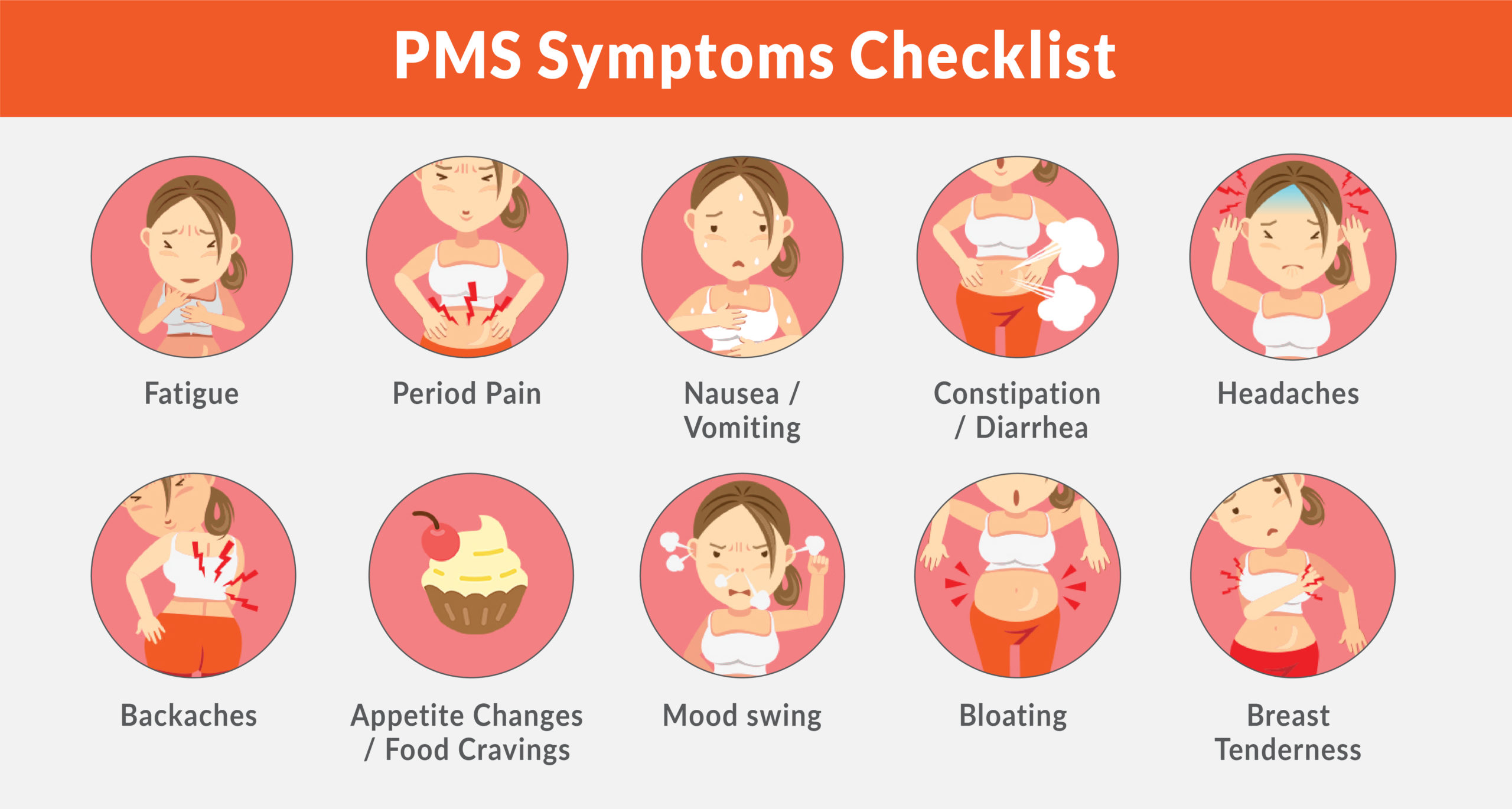Premenstrual Syndrome (PMS): Symptoms, Causes, Treatment
What are the symptoms of PMS?
Premenstrual syndrome (PMS) refers to a group of physical and emotional symptoms that many women experience in the days or weeks leading up to their menstrual period. The symptoms can vary widely from person to person, but common symptoms of PMS include:
- Mood swings: Feelings of irritability, sadness, or anxiety are common in women with PMS.
- Fatigue: Many women experience increased tiredness or fatigue during the premenstrual period.
- Bloating: Some women experience bloating or a feeling of fullness in the abdomen.
- Breast tenderness: The breasts may feel swollen, tender, or painful to the touch.
- Food cravings: Cravings for certain types of food, particularly sweet or salty foods, are common in women with PMS.
- Headaches: Some women experience headaches or migraines during the premenstrual period.
- Muscle or joint pain: Pain or achiness in the muscles or joints may occur.
- Difficulty concentrating: Some women find it harder to concentrate or focus during the premenstrual period.
- Sleep disturbances: Changes in sleep patterns, such as insomnia or increased need for sleep, may occur.
- Acne: Some women experience an increase in acne or other skin problems.
It’s important to note that not all women experience all of these symptoms, and the severity of symptoms can vary from month to month. If the symptoms of PMS are severe or significantly interfere with daily life, it may be a sign of a more serious condition called premenstrual dysphoric disorder (PMDD), which requires medical attention.
What are the causes of PMS?
The exact cause of premenstrual syndrome (PMS) is not fully understood, but it is believed to be related to hormonal changes that occur during the menstrual cycle. Fluctuations in hormone levels, particularly estrogen and progesterone, are thought to play a role in the development of PMS. Other factors that may contribute to PMS include:
- Chemical changes in the brain: Changes in neurotransmitter levels, such as serotonin, may affect mood and contribute to PMS symptoms.
- Sensitivity to hormonal changes: Some women may be more sensitive to hormonal fluctuations, leading to the development of PMS symptoms.
- Stress: Stress can exacerbate PMS symptoms and may play a role in their development.
- Dietary factors: Certain dietary factors, such as consumption of caffeine, alcohol, or salty foods, may worsen PMS symptoms.
- Lifestyle factors: Lack of exercise, poor sleep habits, and smoking may contribute to the development or worsening of PMS symptoms.
- Underlying medical conditions: Women with certain underlying medical conditions, such as depression, anxiety disorders, or thyroid disorders, may be more likely to experience PMS.
It’s important to note that the exact cause of PMS can vary from person to person, and what triggers symptoms in one woman may not affect another. Hormonal changes are believed to be a key factor in PMS, but other factors may also play a role.
What is the treatment for PMS?
Treatment for premenstrual syndrome (PMS) focuses on relieving symptoms and improving quality of life. The specific treatment approach can vary depending on the severity of symptoms and individual needs. Here are some common treatment options for PMS:
- Lifestyle changes:
- Regular exercise: Physical activity can help improve mood and reduce symptoms of PMS.
- Healthy diet: Eating a balanced diet rich in fruits, vegetables, whole grains, and lean proteins can help reduce symptoms.
- Stress management: Techniques such as yoga, meditation, or deep breathing exercises can help reduce stress and improve symptoms.
- Medications:
- Nonsteroidal anti-inflammatory drugs (NSAIDs): NSAIDs such as ibuprofen or naproxen can help relieve pain and discomfort associated with PMS.
- Hormonal contraceptives: Birth control pills or other hormonal contraceptives may help regulate hormonal fluctuations and reduce symptoms.
- Antidepressants: Selective serotonin reuptake inhibitors (SSRIs) may be prescribed to help relieve mood symptoms associated with PMS.
- Nutritional supplements:
- Calcium: Calcium supplements may help reduce symptoms of PMS.
- Magnesium: Magnesium supplements may also be beneficial for some women with PMS.
- Alternative therapies:
- Herbal remedies: Some women find relief from symptoms with herbal supplements such as chasteberry (Vitex agnus-castus) or evening primrose oil.
- Acupuncture: Acupuncture may help reduce symptoms of PMS in some women.
- Cognitive behavioral therapy (CBT):
- CBT can help women develop coping strategies and manage stress, which may reduce the severity of PMS symptoms.
It’s important to talk to a healthcare provider before starting any new treatment for PMS, as some treatments may interact with other medications or conditions. Keeping a symptom diary can also be helpful in identifying patterns and triggers for symptoms, which can guide treatment decisions.




